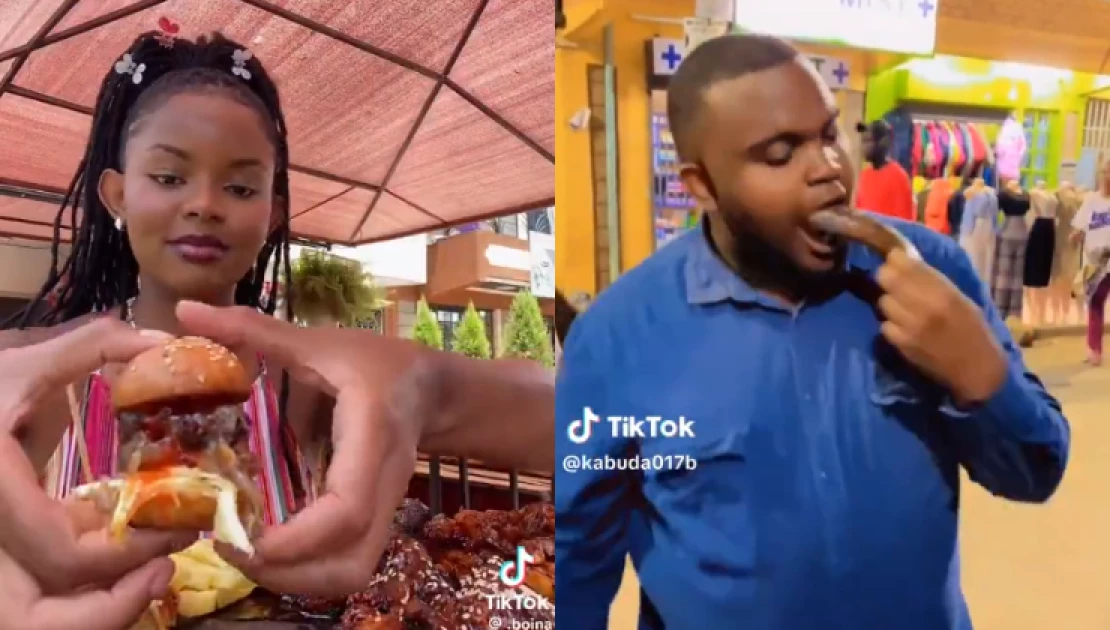Mukbang: The rise of eating videos and why dietitians are concerned

A side-by-side image of popular Kenyan TikTok food content creators Boina and Kabuda.
If you use
YouTube or TikTok, you might have seen a category of videos called 'Mukbang,'
which is a combination of the Korean terms for "broadcast" and
"eating."
Mukbang, as
the name suggests, entails witnessing a lone host consume a substantial
quantity of food.
While
the trend is making influencers and binge eaters wealthy, health experts warn
that the videos are spreading an alarming wrong message about health.
Dr
Easther Ateka, a nutritionist, says it is reckless to think that the
implications of unhealthy eating habits will not catch up with you.
“Why
would anyone think that they can get away with eating exorbitant amounts
without it catching up with you? Unfortunately, these videos encourage
overconsumption but shy away from addressing the potential consequences such as
emotional eating, stomach upset, elevated eating disorder and chronic
diseases," she explained.
This
trendy eating shows have content creators sharing videos of eating mostly junk
fatty foods sometimes for over an hour.
The
nutritionist points out that seeing videos like this on a regular basis may
negatively affect your attitude towards food, particularly if you have an
eating disorder or an already tense connection with nutrition.
“While
the videos may still catch the interest of people who are scrolling past, the
cases of eating disorders are higher than ever, especially among adolescents
and young adults. Watching mukbang could also negatively impact people on the
other side of the disordered eating spectrum— those who partake in emotional
eating and those with a tendency to under-consume, as is the case with
anorexia,” she said.
According
to her, it is quite okay to enjoy eating and even to watch others eat. However,
nutritionists claim that mukbang alters a perfectly natural pleasure into
something that can be harmful.
"Mukbang
videos show viewers audiovisual footage of people eating food in quantities
that are typically associated with binges," Dr Ateka who deals with eating
disorder told Citizen Digital.
“People with
eating disorders or disordered eating may be impacted by the normalisation of
these behaviours because they may be seen as appropriate forms of consumption."
Dr Ateka
adds that the unrealistic portions attached to Mukbang content creators who are
sitting there every day consuming all kind of unhealthy portions is dangerous
and considers it a dangerous form of entertainment for people who enjoy such
content.
“As
much as there is a need for viewers to be cautious when consuming this kind of
content, Mukbang content creators should take caution. Eating such huge
portions repeatedly is potentially problematic and will have implications like
obesity and binge eating habits and chronic diseases,” she said.
She
also cautioned that the pressure to maintain their personalities and win over
fans can have a major negative impact on the mental health of content creators.
“It
is imperative that online spaces be far more sensitive because it can be quite
upsetting for those who have a history of eating disorders or who are now
struggling with eating disorders," she said.
Perhaps some
of the most famous Kenyan TikTokers that have amassed massive loyal followings
due to this kind of content are Boina and Kabuda.
The two have
posted numerous videos of themselves eating large quantities of food in one
sitting, winning them over a large fanbase and bagging themselves lucrative
endorsement deals in the process.
Want to send us a story? SMS to 25170 or WhatsApp 0743570000 or Submit on Citizen Digital or email wananchi@royalmedia.co.ke
Comments
No comments yet.


Leave a Comment